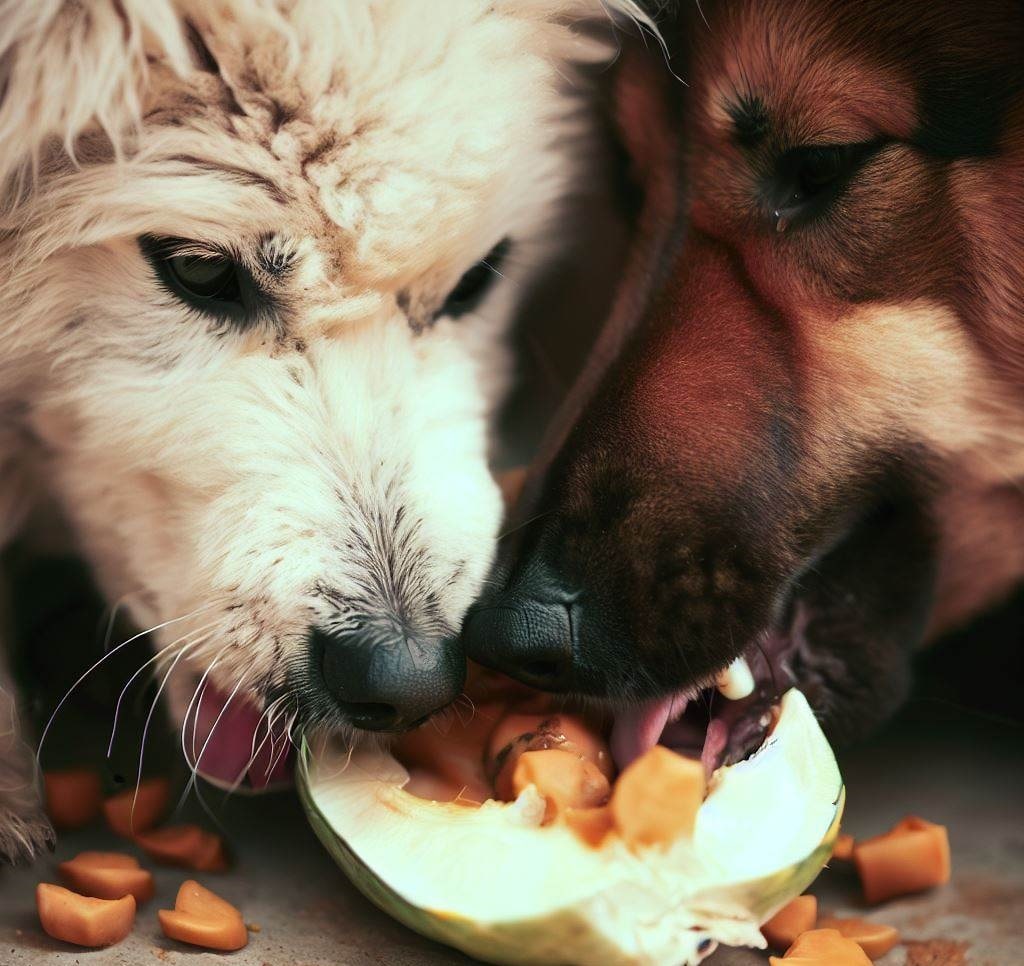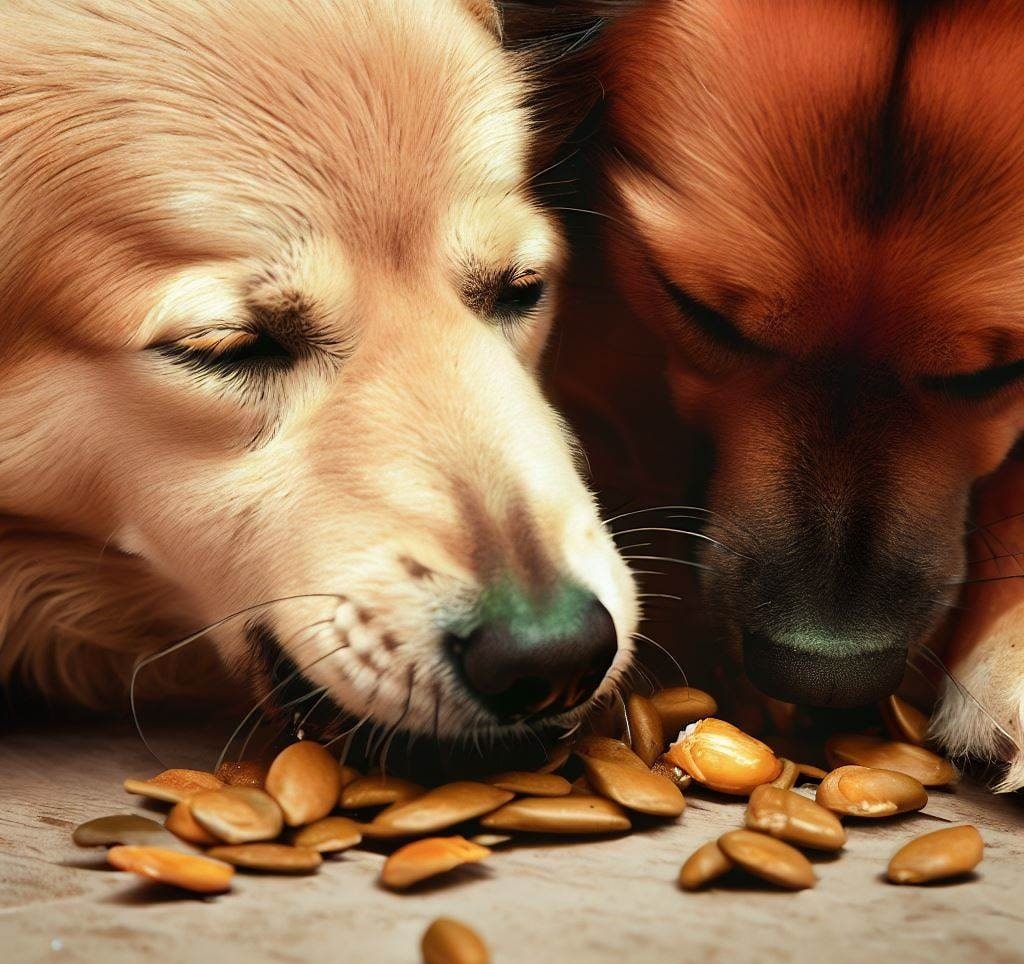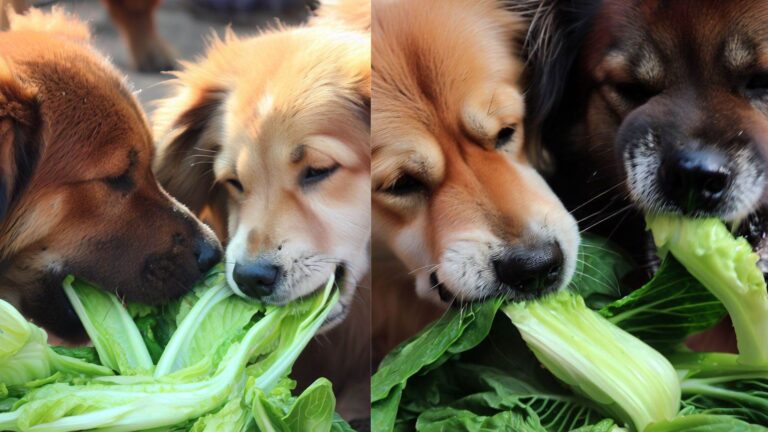Pumpkin is a nutritious and tasty food for both humans and pets. When it comes to dogs, pumpkin can offer a wide range of health benefits, including improved digestion, better immune function, and healthier skin and coat. But what about pumpkin seeds? Can dogs eat pumpkin seeds, and are they safe for our furry friends? In this blog post, we’ll explore the benefits and risks of feeding pumpkin seeds to dogs and provide some guidelines on how to safely incorporate them into their diet.
Table of Contents
Dogs Eat Pumpkin Seeds?
The short answer is yes; dogs can eat pumpkin seeds but with some caveats. Pumpkin seeds are not toxic to dogs and contain a range of beneficial nutrients, such as protein, fiber, healthy fats, vitamins, and minerals. However, they can also pose some risks if given in excessive amounts or in certain conditions.

Benefits of Pumpkin Seeds for Dogs
Pumpkin seeds are a good source of protein, fiber, and essential fatty acids, which can promote healthy digestion, maintain healthy skin and coat, and support immune function. They are also rich in vitamins and minerals, including vitamin E, vitamin K, phosphorus, magnesium, and zinc, which can help regulate blood pressure, promote bone health, and support the nervous system.
Moreover, pumpkin seeds contain high levels of antioxidants, such as carotenoids and tocopherols, which can protect cells from oxidative damage and lower the risk of chronic diseases like cancer and heart disease.
Pumpkin seeds can also act as a natural remedy for some health issues in dogs, such as:
- Worms: Pumpkin seeds contain an amino acid called cucurbitin, which can paralyze and eliminate intestinal parasites, such as tapeworms and roundworms.
- Urinary tract infections: Pumpkin seeds are rich in antioxidants and anti-inflammatory compounds, which can reduce inflammation and promote the healing of the urinary tract.
- Anxiety and stress: Pumpkin seeds contain L-tryptophan, an amino acid that can help regulate mood and reduce anxiety in dogs.
Risks of Pumpkin Seeds for Dogs
While pumpkin seeds can offer several health benefits to dogs, they can also pose some risks if given in excessive amounts or in certain conditions. Here are some risks to be aware of:
- Digestive upset: Too many pumpkin seeds can cause digestive upset in dogs, leading to diarrhea, vomiting, and abdominal discomfort. This is because pumpkin seeds are high in fiber and can be hard to digest if given in large amounts.
- Allergies: Some dogs may be allergic to pumpkin seeds, leading to symptoms such as itching, hives, and swelling. If your dog shows any signs of an allergic reaction after eating pumpkin seeds, stop giving them immediately and consult your vet.
- Intestinal obstruction: Pumpkin seeds, like any other seeds or nuts, can pose a choking hazard or cause an intestinal obstruction if ingested whole or in large pieces. Be sure to remove the shells and crush the seeds before giving them to your dog.
How to Safely Feed Pumpkin Seeds to Dogs
If you want to incorporate pumpkin seeds into your dog’s diet, here are some tips to follow:
- Start small: Begin by giving your dog a small amount of pumpkin seeds, such as one or two seeds, and observe their reaction. If they tolerate them well, you can gradually increase the amount over time.
- Crush the seeds: To prevent choking and facilitate digestion, crush the pumpkin seeds into smaller pieces or grind them into a powder before giving them to your dog.
- Use moderation: Like any other treat, pumpkin seeds should be given in moderation as part of a balanced diet. Too many seeds can cause digestive upset or lead to obesity, which can affect your dog’s health.
- Consult your vet: If you have any concerns about feeding pumpkin seeds to your dog, it’s always a good idea to consult your veterinarian first. They can advise you on the appropriate amount to give based on your dog’s size, age, overall health, and any specific health conditions they may have.
- Choose organic, unsalted seeds: When selecting pumpkin seeds for your dog, choose organic, unsalted seeds that are free from additives and preservatives. Salted or flavored seeds can be harmful to your dog’s health, and organic seeds are free from harmful pesticides and chemicals.
- Consider pumpkin seed oil: If your dog is a picky eater or has difficulty digesting whole seeds, you can try giving them pumpkin seed oil instead. Pumpkin seed oil contains the same nutrients and health benefits as whole seeds but is easier to digest and can be mixed with your dog’s food.
Read More: Can Dogs Eat Egg Shells?
FAQs

Are pumpkin seeds safe for dogs to eat?
Yes, pumpkin seeds are safe for dogs to eat in moderation.
Can dogs eat pumpkin seeds with shells on?
No, dogs should not eat pumpkin seeds with shells on as they can be difficult to digest and pose a choking hazard.
How many pumpkin seeds can I give my dog?
It’s best to start with a small amount of pumpkin seeds, such as one or two seeds, and gradually increase the amount over time.
Can pumpkin seeds cause digestive problems in dogs?
Yes, too many pumpkin seeds can cause digestive upset in dogs, leading to diarrhea, vomiting, and abdominal discomfort.
Are there any health benefits to feeding my dog pumpkin seeds?
Yes, pumpkin seeds are a good source of protein, fiber, and essential fatty acids, which can promote healthy digestion, maintain healthy skin and coat, and support immune function. They are also rich in vitamins and minerals and can act as a natural remedy for some dog health issues, such as worms, urinary tract infections, and anxiety.
Can dogs be allergic to pumpkin seeds?
Yes, some dogs may be allergic to pumpkin seeds, leading to symptoms such as itching, hives, and swelling. If your dog shows any signs of an allergic reaction after eating pumpkin seeds, stop giving them immediately and consult your vet.
Can pumpkin seeds help prevent worms in dogs?
Yes, pumpkin seeds contain an amino acid called cucurbitin, which can paralyze and eliminate intestinal parasites, such as tapeworms and roundworms.
Can pumpkin seeds help with my dog’s urinary tract infection?
Yes, pumpkin seeds are rich in antioxidants and anti-inflammatory compounds, which can reduce inflammation and promote the healing of the urinary tract.
Can I give my dog roasted pumpkin seeds?
Yes, you can give your dog roasted pumpkin seeds, but make sure they are unsalted and free from any seasonings or additives.
Can pumpkin seeds help with my dog’s anxiety?
Yes, pumpkin seeds contain L-tryptophan, an amino acid that can help regulate mood and reduce anxiety in dogs.
Can puppies eat pumpkin seeds?
Yes, puppies can eat pumpkin seeds in moderation, but it’s best to start with a small amount and gradually increase over time. As with adult dogs, it’s important to ensure that the pumpkin seeds are crushed or ground into smaller pieces to prevent choking and facilitate digestion.
Conclusion
In conclusion, pumpkin seeds can be a nutritious and healthy addition to your dog’s diet when given in moderation and with caution.
However, it’s important to ensure that the seeds are organic, unsalted, and free from any additives or preservatives. It’s also best to consult with your veterinarian before feeding pumpkin seeds to your dog, especially if they have any health conditions or allergies. By following these guidelines, you can safely and effectively incorporate pumpkin seeds into your dog’s diet and help them live a happy and healthy life.







One Comment